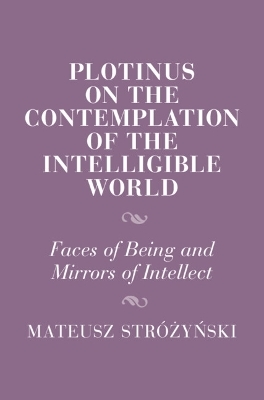
Plotinus on the Contemplation of the Intelligible World
Faces of Being and Mirrors of Intellect
Seiten
2024
Cambridge University Press (Verlag)
978-1-009-49486-1 (ISBN)
Cambridge University Press (Verlag)
978-1-009-49486-1 (ISBN)
- Lieferbar (Termin unbekannt)
- Versandkostenfrei innerhalb Deutschlands
- Auch auf Rechnung
- Verfügbarkeit in der Filiale vor Ort prüfen
- Artikel merken
This study offers an experiential and practical way of understanding Plotinus' thought and philosophy through a focus on the act of contemplation. Mateusz Stróżyński argues that contemplation, or direct seeing of the principles of reality, is not merely a part of Plotinus' thought, but rather a significant dimension of it.
In this study, Mateusz Stróżyński offers an experiential and practical way of understanding Plotinus' thought and philosophy through a focus on the act of contemplation. He argues that contemplation, or direct seeing of the principles of reality, is not merely a part of Plotinus' thought, but rather a significant dimension of it. Moreover, he argues that Plotinus understands metaphysics as a conceptual and propositional description of reality from a third-person perspective, as well as an expression of an experience of that reality from a first-person perspective. Stróżyński focuses on the first phase of the journey to the Good, namely, on the contemplation of the intelligible world: Nature, Soul, and Intellect. He describes the fall of the soul and her return through the lens of the so-called “Great Kinds”: Being, Movement, Rest, Difference, and Identity. Stróżyński also shows how this concept, derived from Plato's Sophist, is creatively used by Plotinus to explain both the loss and the restoration of our ability to contemplate through philosophical practice.
In this study, Mateusz Stróżyński offers an experiential and practical way of understanding Plotinus' thought and philosophy through a focus on the act of contemplation. He argues that contemplation, or direct seeing of the principles of reality, is not merely a part of Plotinus' thought, but rather a significant dimension of it. Moreover, he argues that Plotinus understands metaphysics as a conceptual and propositional description of reality from a third-person perspective, as well as an expression of an experience of that reality from a first-person perspective. Stróżyński focuses on the first phase of the journey to the Good, namely, on the contemplation of the intelligible world: Nature, Soul, and Intellect. He describes the fall of the soul and her return through the lens of the so-called “Great Kinds”: Being, Movement, Rest, Difference, and Identity. Stróżyński also shows how this concept, derived from Plato's Sophist, is creatively used by Plotinus to explain both the loss and the restoration of our ability to contemplate through philosophical practice.
Mateusz Stróżyński is associate professor in the Institute of Classical Philology at Adam Mickiewicz University, in Poznań, Poland. He is the co-translator and co-editor, with J. Fiećko and J. S. Boparai, of Adam Mickiewicz: Metaphysical Poems (2023) and founding editor of the online journal Antigone.
Introduction; Part I. Descent and Fall: 1. So many mirrors; 2. Out of the father's house; Part II. Soul: 3. The beautiful face of justice; 4. The mirror of nature; 5. The luminous sphere; Part III. Intellect: 6. Looking into our face; 7. All together in eternity; 8. There is only one world; 9. Pamprosopon; Conclusion; Bibliography; Index.
| Erscheinungsdatum | 05.11.2024 |
|---|---|
| Reihe/Serie | Cambridge Studies in Religion and Platonism |
| Zusatzinfo | Worked examples or Exercises |
| Verlagsort | Cambridge |
| Sprache | englisch |
| Themenwelt | Geisteswissenschaften ► Philosophie ► Philosophie Altertum / Antike |
| ISBN-10 | 1-009-49486-4 / 1009494864 |
| ISBN-13 | 978-1-009-49486-1 / 9781009494861 |
| Zustand | Neuware |
| Haben Sie eine Frage zum Produkt? |
Mehr entdecken
aus dem Bereich
aus dem Bereich
mit Sokrates, Seneca, Platon & Co. im Gespräch
Buch | Hardcover (2023)
FinanzBuch Verlag
18,00 €


